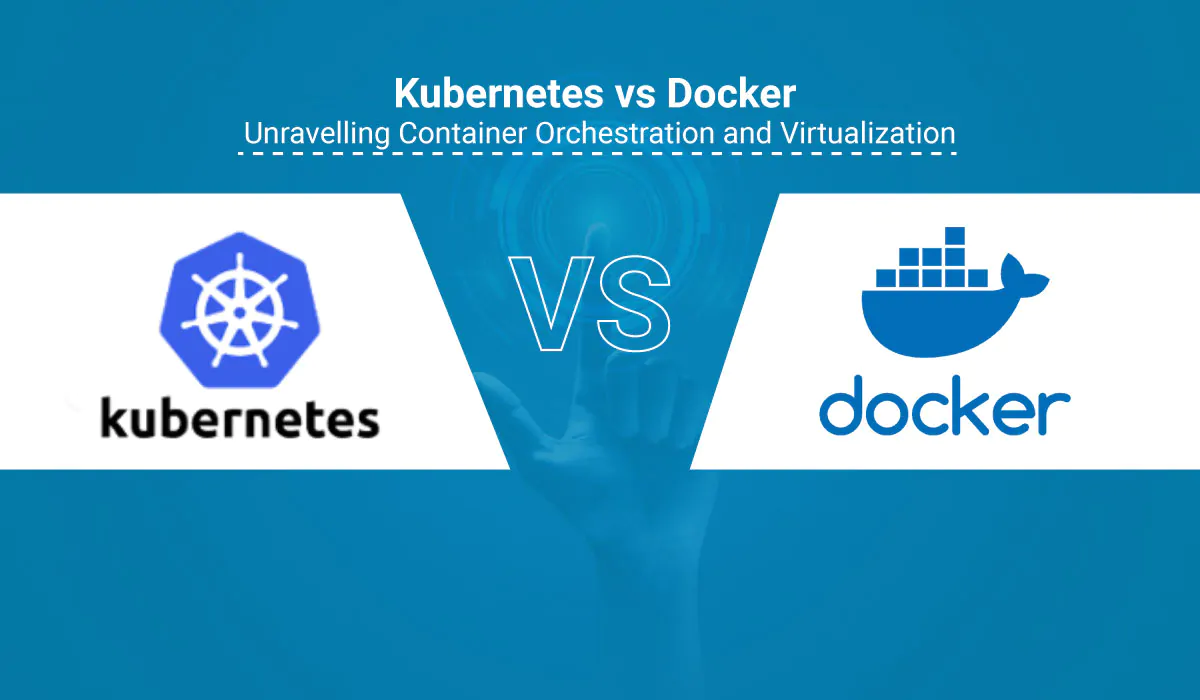Kubernetes vs Docker: Introduction
In the rapidly evolving landscape of containerization and virtualization, two prominent players stand out: Kubernetes and Docker. As organizations strive for agility, scalability, and seamless deployment processes, understanding the nuances between these technologies becomes crucial. In this comprehensive analysis, we will delve into the key difference between docker and Kubernetes, unravelling the intricacies of container orchestration and virtualization. In the subsequent sections, we will navigate through the intricacies of Kubernetes vs Docker, exploring how they cater to the dynamic needs of modern applications, particularly in the realm of microservices.
What is Docker?
Let’s start by dissecting Docker. Docker is a containerization platform that revolutionized the software development lifecycle. It enables developers to package applications and their dependencies into a standardized unit known as a container. These containers are lightweight, portable, and can run consistently across different environments. Docker simplifies the process of building, shipping, and running applications, fostering a more efficient and reproducible development environment.

What is Kubernetes?
On the other hand, Kubernetes is a powerful container orchestration platform that manages the deployment, scaling, and operation of application containers. Originally developed by Google, Kubernetes has gained widespread adoption due to its ability to automate the deployment and scaling of containerized applications. Kubernetes orchestrates containers, ensuring they run seamlessly across a cluster of machines, handling load balancing, monitoring, and self-healing. By leveraging key DevOps services, Kubernetes ensures continuous integration and delivery, allowing teams to streamline their development pipelines.
Difference Between Docker and Kubernetes
While Kubernetes vs Docker often appear together in discussions about containerization, it’s crucial to recognize their distinct roles and functionalities.
Docker primarily focuses on the containerization aspect, providing a platform for building, packaging, and distributing containers. It ensures that applications and their dependencies are encapsulated in a consistent environment, making them easy to deploy and run.
On the other hand, Kubernetes steps in as a container orchestration solution. It takes care of the management, scaling, and deployment of containerized applications, allowing organizations to run containerized workloads efficiently at scale. Kubernetes is not a replacement for Docker but rather complements it by providing a layer of abstraction for managing multiple Docker containers.
Diving Deeper: Kubernetes vs Docker Swarm
To understand the container orchestration landscape fully, it’s essential to explore Kubernetes vs docker swarm, another contender in the field. Docker Swarm is Docker’s native clustering and orchestration solution, designed to manage a group of Docker hosts and orchestrate container deployment.
However, when comparing Kubernetes vs Docker Swarm, several factors come into play. Kubernetes, with its robust feature set, offers advanced capabilities such as automatic load balancing, rolling updates, and self-healing. Docker Swarm, while user-friendly and suitable for smaller-scale deployments, lacks some of the advanced features that Kubernetes provides, making it less suitable for complex and large-scale applications.
Kubernetes, with its declarative configuration and rich ecosystem, has become the preferred choice for enterprises seeking a comprehensive container orchestration solution. It seamlessly integrates with various cloud service providers and offers extensibility through its API, making it a versatile and future-proof choice for containerized applications.

Kubernetes vs Docker: Key Differences
To illustrate the key differences between Kubernetes and Docker, let’s consider a real-world scenario. Imagine a scenario where an e-commerce application needs to scale based on fluctuating user demand.
Docker would come into play during the development phase, allowing developers to encapsulate the application code, dependencies, and runtime into a container. This containerized application becomes a portable unit that can run consistently across various environments, from local development machines to production servers.
Now, as the e-commerce application gains popularity, Kubernetes takes the stage for orchestration. Kubernetes can dynamically scale the number of containerized application instances based on the incoming traffic. It ensures that the application is highly available, load-balanced, and capable of handling sudden spikes in user activity. Kubernetes achieves this through its robust scheduling, auto-scaling, and self-healing mechanisms.
Kubernetes vs Docker: Benefits and Challenges
Each technology comes with its own set of benefits and challenges. Docker simplifies the packaging and distribution of applications, making it easy for developers to create reproducible environments. Its user-friendly interface and quick learning curve make it an attractive choice for individual developers and small teams.
However, as applications grow in complexity and scale, the need for a container orchestration platform becomes evident. This is where Kubernetes shines. Kubernetes provides a comprehensive solution for managing containers at scale, offering advanced features for deployment, scaling, and maintenance.
Despite their advantages, both Kubernetes vs Docker pose challenges. Docker might be criticized for lacking some of the orchestration features found in Kubernetes, making it less suitable for large-scale enterprise applications. Kubernetes, on the other hand, has a steeper learning curve and may be perceived as complex for smaller projects or teams with limited resources.
Kubernetes vs Docker: Conclusion
In the tug-of-war between Kubernetes vs Docker, it’s important to recognize their symbiotic relationship rather than viewing them as direct competitors. Docker excels at simplifying the containerization process, while Kubernetes takes centre stage in orchestrating and managing these containers at scale.
Choosing between Kubernetes and Docker depends on the specific needs and scale of your project. For smaller applications and individual developers, Docker may suffice, providing a lightweight and user-friendly containerization solution. However, as applications grow in complexity and demand, Kubernetes emerges as the go-to choice for orchestrating containerized workloads seamlessly.
You can get in touch with Monarch Innovation, an outsource engineering company that serves clients all over the world through strategic alliances, collaborations, and partnerships if you’re also searching for someone to handle all your project requirements and offer creative and dependable solutions that will boost your business’s future growth. With their cutting-edge infrastructure and staff of extremely skilled specialists, they have a competitive advantage in the market. The two fundamental values that Monarch Innovation cultivates are creativity and innovation.

